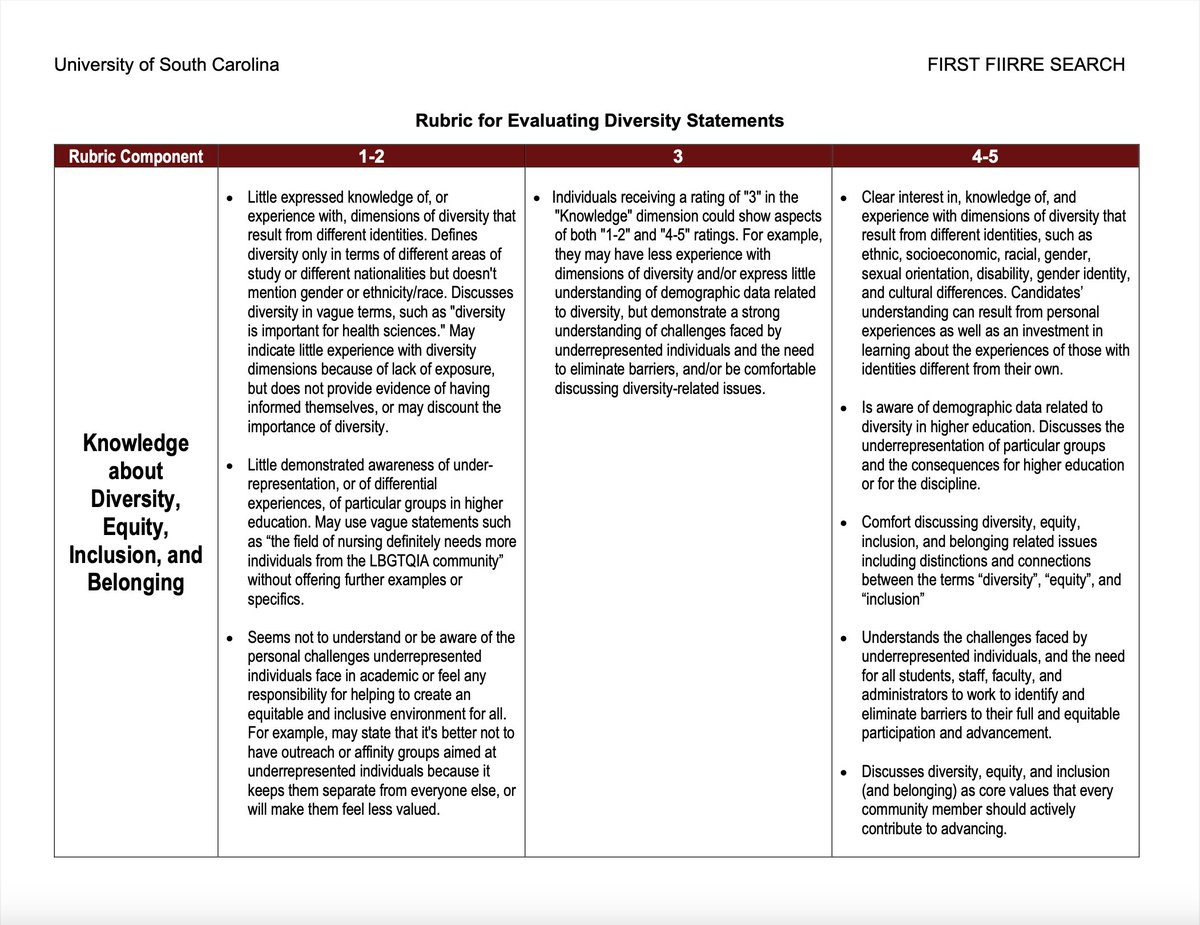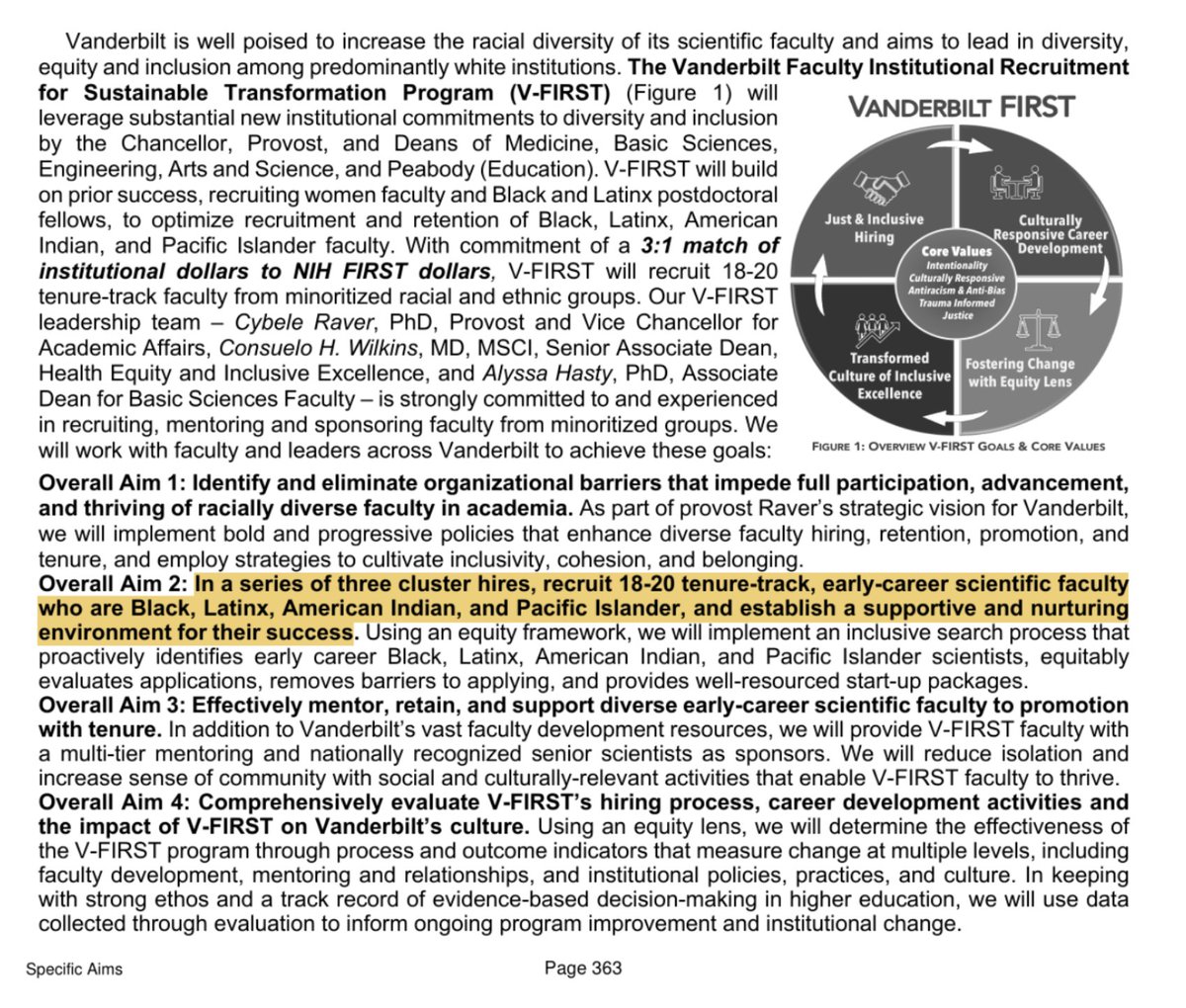At the NIH, the Distinguished Scholars Program hires scientists who show a “commitment to diversity, equity, and inclusion.”
Through a public records request, I’ve acquired redacted NIH hiring documents that show what this criterion looks like in practice.
🧵
Through a public records request, I’ve acquired redacted NIH hiring documents that show what this criterion looks like in practice.
🧵

Note, the NIH's former chief DEI officer emphasized that this program does not limit hiring based on race or sex—because, as she puts it below, “legally we cannot.”
Instead, it purports to boost diversity by proxy, hiring scientists who value DEI.
But...
Instead, it purports to boost diversity by proxy, hiring scientists who value DEI.
But...
...the records I acquired show—first of all—that NIH applicant reviewers repeatedly highlight gender and minority status.
Here's an example, in the section soliciting positive and negative comments on the potential NIH scientists.
Here's an example, in the section soliciting positive and negative comments on the potential NIH scientists.

“Female [redacted] physician scientist,” “URM scientist,” “URM female scientist.”
These references appear consistently throughout the records, raising obvious legal questions. Again, the NIH's chief DEI officer said the program cannot legally limit hiring based on race/sex.



These references appear consistently throughout the records, raising obvious legal questions. Again, the NIH's chief DEI officer said the program cannot legally limit hiring based on race/sex.




Scientific excellence, moreover, clearly takes a backseat in the program.
A reviewer says of one candidate: “Excellent scientist but not particularly distinguished in the area of diversity in science.”
Another: “Unimpressive diversity statement, good scientist…”
A reviewer says of one candidate: “Excellent scientist but not particularly distinguished in the area of diversity in science.”
Another: “Unimpressive diversity statement, good scientist…”

Another candidate mentored several minorities, but in their application, their “details on mentoring focused mostly on scientific accomplishments rather than diversity commitment.”
They were deemed a "mediocre" candidate.
They were deemed a "mediocre" candidate.

Downplaying scientific excellence is bad enough. But here’s the bigger program: the records reveal an ideological bias.
Throughout, scientists are lauded for using the language of identity politics, and punished for not espousing the right understanding of diversity.

Throughout, scientists are lauded for using the language of identity politics, and punished for not espousing the right understanding of diversity.


“The fact that she has [redacted] shows a lack of sensitivity to issues central to diversity,” one comment notes.
The program is “not solely focused on women,” another notes cryptically.

The program is “not solely focused on women,” another notes cryptically.


At times, the ideological orientation of these NIH assessments becomes explicit.
Here, a candidate is praised for understanding “structural racism" and "intersectionality."
(Well, specifically, the "impace" of intersectionality).
Here, a candidate is praised for understanding “structural racism" and "intersectionality."
(Well, specifically, the "impace" of intersectionality).

Reviewers praise another scientist for engaging in diversity and inclusion “activism,” and another for espousing the right understanding of “structural inequities.” 



The NIH deemed this program such a smashing success that it created a grant program to spread these practices around the country.
NIH FIRST has dolled out a quarter-billion-dollars in grants for universities to hire scientists who show a “commitment to DEI.”
NIH FIRST has dolled out a quarter-billion-dollars in grants for universities to hire scientists who show a “commitment to DEI.”
I've reported extensively on the NIH FIRST program. As it turns out, it emulates the Distinguished Scholars Program pretty closely.
A few examples.
First, here's the DEI assessment rubric several NIH FIRST recipients have used. Clear ideological undertones.



A few examples.
First, here's the DEI assessment rubric several NIH FIRST recipients have used. Clear ideological undertones.




Second, the NIH FIRST heavily emphasizes a commitment to DEI. Universities and med schools hiring faculty through the program must require and heavily weigh DEI statements.
It also explicitly prohibits using racial preferences.
It also explicitly prohibits using racial preferences.

Third, documents acquired through public records requests show, universities ignore the on-paper rules against discrimination and blatantly hired based on race.
One grant recipient said in an email, "I don't want to hire white men for sure."

One grant recipient said in an email, "I don't want to hire white men for sure."


The NIH intended to create a career pipeline for underrepresented minorities by screening scientists for their commitment to DEI.
In practice, its programs used racial preferences while also screening out scientists based on their commitment to a social cause.
In practice, its programs used racial preferences while also screening out scientists based on their commitment to a social cause.
As I wrote in WSJ, the distorted priorities of American academia often have roots in the federal government.
In the end, the NIH has helped fund the thriving scholar-activist career pipeline.
wsj.com/opinion/bhatta…
In the end, the NIH has helped fund the thriving scholar-activist career pipeline.
wsj.com/opinion/bhatta…
Of interest @eyeslasho @fentasyl @TheRabbitHole84 @robbystarbuck @elonmusk @DrJBhattacharya
A huge shout out to @RussellNobile of Judicial Watch, who helped me get these records un-redacted (see below).
Some of the remaining redactions raise yet more questions. With the NIH, you often have to go the legal route, and Russ is pushing for more.
Some of the remaining redactions raise yet more questions. With the NIH, you often have to go the legal route, and Russ is pushing for more.

Of interest to those paying watching the debate over diversity statements in academic hiring. @glukianoff @kewhittington @jonkay @JonHaidt @sapinker @JacobAShell @aaronsibarium @RogueWPA @AAUP @nickconfessore @NellieBowles @jflier @LHSummers @MichaelRegnier @CHSommers
*paying attention to 😬
• • •
Missing some Tweet in this thread? You can try to
force a refresh






























